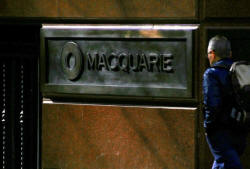|
Life after debt?
Macquarie's junk lending unit sputters
 Send a link to a friend
Send a link to a friend
 [July 26, 2017]
By Jamie Freed and Jonathan Barrett [July 26, 2017]
By Jamie Freed and Jonathan Barrett
SYDNEY (Reuters) - Macquarie Group,
Australia's leading investment bank, has a hole to fill.
In the years after the global financial crisis, the bank's Corporate and
Asset Finance (CAF) unit - an opaque business analysts call a "black
box" - accounted for almost a third of Macquarie's earnings, driving
growth fueled by a A$33 billion ($26.18 billion)-plus bet on largely
non-investment grade debt.
But the high-margin, junk loan portfolio is now shrinking as investments
mature, competition heats up and the conditions that fed a hunger for
that debt - the financial crisis and then Europe's bank jitters - have
calmed.
That's left the unit, and Macquarie, having to find growth elsewhere.
A Reuters analysis of dozens of disclosure documents and bank
presentations shows the CAF unit's junk-heavy portfolio has shrunk by 40
percent to A$6.8 billion in March - its lowest level in more than six
years - from A$11.4 billion in 2015.
Divisional profits increased ten-fold in three years to A$698 million in
2012 before the growth rate tempered, with profits having flatlined over
the last three years.

As CAF's growth has slowed, so too has Macquarie's. In the financial
year to end-March, net profit rose 7.5 percent - a fraction of the high
double-digit growth of recent years.
"Deal volumes are down... it's a competitive market again," said one
person close to the CAF division.
The unit isn't just junk debt, it also includes mundane businesses like
aircraft leasing and auto finance. But its growth was driven by the bet
on non-investment grade debt in the aftermath of the financial crisis.
"It's not a conscious decision to wind it down," said Omkar Joshi,
portfolio manager at Regal Funds Management, which doesn't have a
position in Macquarie as it sees the shares as fairly valued. "It's just
that the opportunities don't exist for the moment."
The loans in the CAF book mature on average every 3-5 years, according
to a Macquarie presentation. And with few new options, that's a concern
for CAF's high-flying boss, 46-year-old Ben "Brains" Brazil, one of the
bank's best paid executives.
Casting around, CAF is increasing its presence in Britain, where it has
been sizing up the mortgage market, and it is setting up an office in
San Francisco, according to recruitment advertisements, to tap the
technology sector.
It financed a 30 million pound ($39.1 million) acquisition of three
office buildings in London in May, and last year supported a 300 million
euro refinancing of a private hospital in Dublin. In New York, it's
promoting itself as a provider of middle-market leveraged finance
solutions.
"BEN'S BOOK"
Sometimes referred to as "Ben's book", the CAF portfolio includes bonds,
bank and mortgage debt, and loans that Macquarie originates.
"The portfolio is predominantly senior secured loans which have numerous
covenants and are secured against high quality assets – almost 90
percent of these are to non-investment grade borrowers," a bank
spokeswoman said in a statement to Reuters.

But part of the mystique around CAF is that even investors who follow
Macquarie closely don't know what's in it.
The bank doesn't record mark-to-market gains and losses on the book
because, it says, it holds the vast majority to maturity. This means
shareholders don't see the highs and lows of what could be a volatile
part of the business.
[to top of second column] |

A pedestrian walks past the logo of Australia's biggest investment
bank Macquarie Group Ltd which adorns a wall on the outside of their
Sydney office headquarters in central Sydney, Australia, July 18,
2017. REUTERS/David Gray

That opacity also helps ward off prying eyes - and rivals.
But healthier credit markets since the European banking crisis mean there is
less disruption for Brazil's team to profit from, and more competition.
Brazil's short-term bonus - a rough gauge analysts use to measure the junk
book's profitability - slipped to A$6.4 million in the year to March, from A$6.7
million a year earlier.
He declined to comment for this story.
CAVEAT EMPTOR
The son of an affluent Queensland farmer, Brazil joined Macquarie over two
decades ago. He was the protégé of the current CEO Nicholas Moore, and one of
his first jobs was to advise the late media mogul Kerry Packer on a potential
buyout of Qantas, the country's biggest airline.
In 2006, he took part in a complex deal to start selling PBL Media, then run by
Packer's son James, to private equity group CVC. He would go on to sit on the
board of Packer's Crown Resorts.
"He's very smart. When it comes to sniffing out opportunities in imperfectly
priced markets, there are none better," said a Sydney lawyer who worked on the
CVC deal.
At the height of the financial crisis in 2008, Australia's Labor-led government
said it would allow banks to pay a small fee in return for using the
government's AAA rating to issue debt. Brazil swooped.
Stressed banks like Royal Bank of Scotland Group PLC offloaded their loan
portfolios at steep discounts to free up capital. The debt was cheap, but the
quality was decent and - Brazil and Macquarie reckoned - likely to be repaid in
full.
Buyers could make 400 basis point spreads on a single trade, and there were
principal gains on the maturing portfolio.

For example, Brazil's team bought debt in motorway service station operator Tank
& Rast Germany in 2009 by picking up senior loans from a distressed European
bank. By the end of 2013, the company was able to refinance all its debt at par,
realizing what Brazil later described as a "significant profit", though he
didn't disclose how much.
"They were one of the few banks able to actually buy these loans, and at a good
price, because their funding cost was much lower," Regal's Joshi said, raising
the issue of the cheap funding behind the junk bond bet - which has prompted
some public criticism of Macquarie.
Australia's then-treasurer, Wayne Swan, said the guarantee was necessary. "We
acted in an entirely appropriate way and a way that basically stopped the
destruction of a significant part of our economy at a really difficult time."
A Macquarie spokeswoman disputed that Macquarie took advantage of the guarantee,
noting the bank's total loan assets fell while the guarantee was in place.
It may take another major market jolt for Brazil's unit to cash in once again.
"It was a great little opportunity while it lasted, but trying to recycle it is
pretty tough," said a veteran banking analyst. "They won't close it down.
They'll just wait for credit spreads to blow out again and try to trade around
it."
(Reporting by Jamie Freed and Jonathan Barrett in SYDNEY; Editing by Clara
Ferreira Marques and Ian Geoghegan)
[© 2017 Thomson Reuters. All rights
reserved.] Copyright 2017 Reuters. All rights reserved. This material may not be published,
broadcast, rewritten or redistributed. |